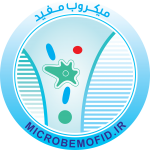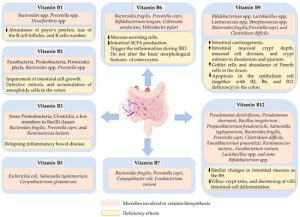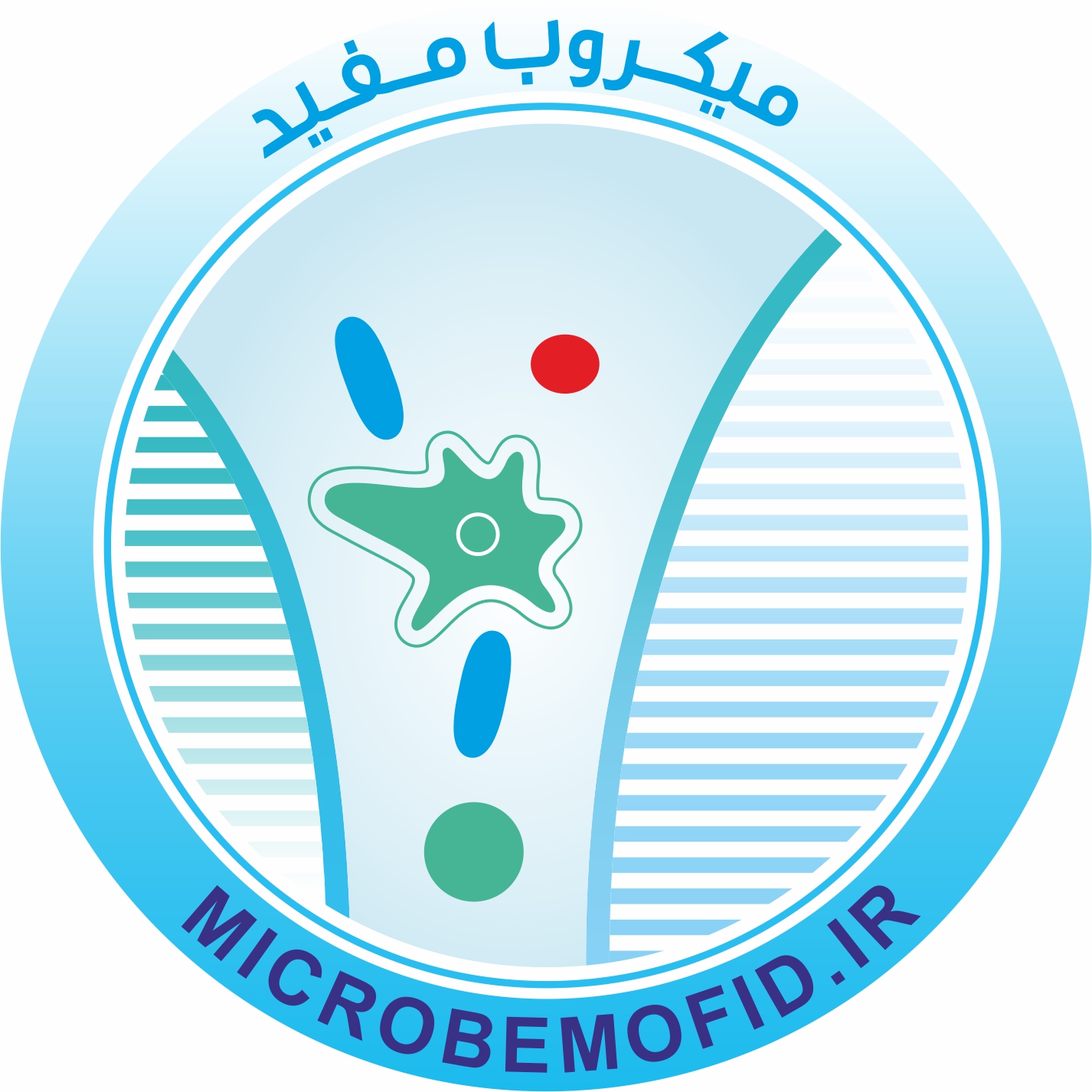The International Scientific Association for Probiotics and Prebiotics (ISAPP) has been redefined prebiotics in 2017. They suggested that some vitamins were included in the category of prebiotics. Vitamins, as organic components, are usually present in foods instead of synthesized in sufficient quantities by the host and can play fundamental role in mediating biological processes in microbes, maintaining microbial homeostasis and intestinal barrier integrity and so, may have a potential use as prebiotics. Vitamins can be divided into two categories: lipophilic vitamins; consisting of vitamin A, D, E and K, and hydrophilic vitamins, which include vitamin B and C.
The effects of fat soluble vitamins on microbiota
Vitamin D is one of the most studied vitamins in the context of gut microecology. Some studies have demonstrated that the composition and diversity of gut microbes are strongly affected by vitamin D deficiency. For example, in an interventional, open-label pilot study, vitamin D3 supplementation was found to decrease the relative abundance of Proteobacteria while increasing that of Bacteroidetes (1). Furthermore, Guida et al. (2) evaluated a diet deficient in vitamin D on a mice model and found thatthe abundance of Firmicutes, Verrucomicrobia and Bacteroidetes decreased. In addition to vitamin D, oral administration of some other vitamins has also been shown to affect the composition of gut microbes.
Tian et al. analyzed fecal samples from vitamin A sufficient and deficient mice and observed a higher
Firmicutes/Bacteroidetes (F/B) ratio in these mice, which is associated with various metabolic diseases (3).
On the contrary, another study found that feeding mice with low levels of vitamin E increased the
abundance of Firmicutes, resulting in a higher F/B ratio in the gut, whereas no significant differences were observed in mouse fed with high doses of vitamin E as compared to the control group (4). Vitamin K in human body usually taken from dietary supplements. Gut microbiota also possess the gene to synthesize vitamin K (5). Dietary vitamin K can be remolded by bacteria such as Eubacterium rectale, Bacillus subtilis and several Bacteroides species in the form of menaquinones, which are able to regulate gut microbiota. Since some genera of Bacteroides and Faecalibacterium lost the ability to synthesize menaquinones, they have to utilize menaquinones made by nearby bacteria as growth factors for themselves (6).
The effects of water soluble vitamins on microbiota
Vitamin B12 may make a contribution in shaping the structure and function of human gut microbial communities through altering the corrinoid profile (7). Oral vitamin B12 supplement may also selectively deplete Bacteroides in C57BL/6 mice (8). This difference suggests that different types of vitamins and different doses of the same vitamin may have different regulatory effects on gut microbes. Specific screening of vitamins and next generation of probiotics (NGPs) is necessary to establish the mechanism by which vitamins affect the gut microbiota in order to determine which vitamins can be used as prebiotics for which NGPs.
Vitamin B2 (riboflavin) supplementation is critical for maintaining the abundance of Faecalibacteriome. Prausnitzii (F. P) in the gut microbiota. Although F. P adheres to the gut mucosa where oxygen diffuses from epithelial cells, it can employ an extracellular electron shuttle of riboflavin and thiols to transfer electrons to oxygen (9).
Provided by: Dr. Nazila Kassaian
Edited by: Marzieh Rahim khorasani
References:
- Bashir, M., B. Prietl, M. Tauschmann, S. I. Mautner, P. K. Kump, G. Treiber, P. Wurm, G. Gorkiewicz, C. Hogenauer, and T. R. Pieber. 2016. Effects of high doses of vitamin D3 on mucosa-associated gut microbiome vary between regions of the human gastrointestinal European Journal of Nutrition 55 (4):1479–۸۹. doi: 10.1007/ s00394-015-0966-2
- Guida, F., S. Boccella, C. Belardo, M. Iannotta, F. Piscitelli, F. De Filippis, S. Paino, F. Ricciardi, D. Siniscalco, I. Marabese, et al. 2020. Altered gut microbiota and endocannabinoid system tone in vitamin D deficiency-mediated chronic pain. Brain, Behavior, and Immunity 85:128–۴۱. doi: 10.1016/j.bbi.2019.04.006
- Tian, Y., R. G. Nichols, J. Cai, A. D. Patterson, and M. T. Cantorna. 2018. Vitamin A deficiency in mice alters host and gut microbial metabolism leading to altered energy homeostasis. The Journal of
Nutritional Biochemistry 54:28–۳۴. doi: 10.1016/j.jnutbio.2017.10.011. - Choi, Y., S. Lee, S. Kim, J. Lee, J. Ha, H. Oh, Y. Lee, Y. Kim, and Y. Yoon. 2020. Vitamin E (a-tocopherol) consumption influences gut microbiota composition. International Journal of Food Sciences and
Nutrition 71 (2):221–۵. doi: 10.1080/09637486.2019.1639637. - McCann, A., I. B. Jeffery, B. Ouliass, G. Ferland, X. Fu, S. L. Booth, T. T. T. Tran, P. W. O’Toole, and E. M. O’Connor. 2019. Exploratory analysis of covariation of microbiota-derived vitamin K and cognition in older adults. The American Journal of Clinical Nutrition 110 (6):1404–۱۵. doi: 10.1093/ajcn/nqz220.
- Ellis, J. L., J. P. Karl, A. M. Oliverio, X. Fu, J. W. Soares, B. E. Wolfe, C. J. Hernandez, J. B. Mason, and S. L. Booth. 2021. Dietary vitamin K is remodeled by gut microbiota and influences community composition. Gut Microbes 13 (1):1887721–۱۶. doi: 10.1080/19490976. 2021.1887721.
- Degnan, P. H., M. E. Taga, and A. L. Goodman. 2014. Vitamin B12 as a modulator of gut microbial ecology. Cell Metabolism 20 (5): 769–۷۸. doi: 10.1016/j.cmet.2014.10.002.
- Kelly, C. J., E. E. Alexeev, L. Farb, T. W. Vickery, L. Zheng, C. Eric L, D. A. Kitzenberg, K. D. Battista, D. J. Kominsky, C. E. Robertson, et al. 2019. Oral vitamin B12 supplement is delivered to the distal gut, altering the corrinoid profile and selectively depleting Bacteroides in C57BL/6 mice. Gut Microbes 10 (6):654–۶۲. doi: 10. 1080/19490976.2019.1597667.
- Khan, M. T., J. M. van Dijl, and H. J. M. Harmsen. 2014. Antioxidants keep the potentially probiotic but highly oxygen-sensitive human gut bacterium Faecalibacterium prausnitzii alive at ambient air.
PLoS One 9 (5):e96097. doi: 10.1371/journal.pone.0096097.


